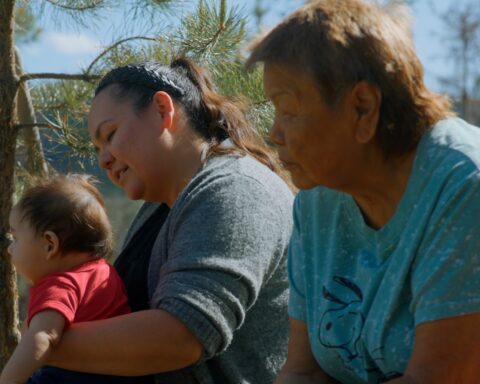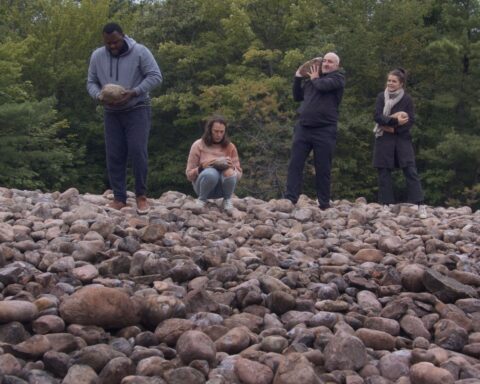Of starfish and jellyfish“Isn’t it better to have a lot of people seeing films that convince them to make a little bit of change, instead of only a few people seeing films that may or may not convince them to make big changes?” This question was posed to me one summer evening by an emergency room (ER) doctor, at a rooftop gathering of “adjusted adults”—my term for people around my age but with handsome incomes, summer cottages, vacation plans and mainstream or centre-left political viewpoints. Folks, in other words, who don’t make activist documentaries nor organize screenings of them.
I was describing my research to the doctor who, amicability aside, I had immediately pegged as a liberal and therefore fitting for my political posturing. Speaking of the current state of affairs of documentary and political activism in Canada, I then focused on the sad lot of radical and progressive political documentaries and their exclusion from populist mainstream currents, those elusive platforms and showcases where liberal documentaries are thriving like jellyfish.
I further developed the metaphor to clarify the situation. Radical political docs are starfish: tough, plucky creatures destined to call home the sediment that forms from the activities of more prosperous organisms, forming small clustered communities of their own. Looking up through the shafts of luminous beams that ignite the circulation of free-moving and ubiquitous jellyfish above, stationary starfish behold their larger, limber liberal cousins.
Respected in their own communities, but mostly invisible to mainstream currents, radical political docs and doc-makers must constantly negotiate the uncertain waters of market exclusion, while the creators of less challenging works swim successfully in the larger lakes and oceans of mainstream culture.
I told the doctor that the continued marginalisation of radical documentaries was deeply troubling, and not just for me, but for the planet. Returning my urgency with his own provocation, my jellyfish-supporting interlocutor summoned the formidable liberal consensus, and with well-meaning affectation, laid bare the challenge for all struggling starfish everywhere. If the radical politics and (he assumed) scrappy delivery of such docs didn’t appeal to the masses, why fight for the starfish of the documentary world?
As futile as the rooftop debate probably was—my position remains the same and it’s unlikely the doctor is spending his long hours in emergency considering my critical perspective—it does serve to demonstrate the seemingly intractable difference between a comfortable majority and an unsettled minority, the latter of which is enraged by the status quo and engaged in dismantling it. Following the moonlit gathering and still thinking about documentary, these two poles of cultural politics reminded me of the holy trinity of Canada’s popular complacency of comfort, immunity and the dreaded consensus.
But, you may be wondering, what does the all rooftop ruckus and marine metaphors have to do with documentary and (dismantling) capitalism?
Resisting resilience
With global capitalism in a protracted, full-fledged crisis, an opportunity has opened up for the airing of dissenting views, alternative perspectives, and critical dialogue on how our socio-economic system is structured. This timely opportunity continues to be squandered by the status quo–supporting mainstream and corporate media, much to the dismay of socialists, anti-capitalists and anarchists everywhere. So while the global elite pulls up its sullied socks and bails out the billionaires whilst further burdening the billions beneath them, alternative media is more important than ever. And while documentary itself can be argued to be an alternative medium, within the genre a mainstream centre is forming, with increasingly disconnected margins—the alternative edges of an alternative, if you will.
Despite its roots in state propaganda, banal educative endeavours and clunky television journals, documentary also rests firmly on a legacy of social justice, anti-oppression and free expression. Where mainstream journalism/entertainment regimes have betrayed Finley Peter Dunne’s maxim to “comfort the afflicted and afflict the comfortable,” documentary has in many cases held up its end of the bargain. As author and academic John Downing (who teaches alternative media and social movements) says, documentary has “shone light on the crimes of the powerful, and portrayed resistance struggles against their dominance.”
Yet not all documentaries are afflicting to the same effect, nor with equal solidarity, spirit and rigour against the status quo. In fact, many documentaries trade on social justice and resistance themes while they deliver tepid political analysis, showcase mainstream perspectives, and call for resilience or reform. The folks at Participant Media call this “social action entertainment.” I call it liberal consensus documentary. Semantics aside, this raft of docs makes for a formidable school of jellyfish. And while I do not discount the role centre-left media has to play in building a fair and just society, I’m concerned recent jellyfish population blooms may be blocking out the sun for the radical starfish as they search to find their own currents. That is to say, I’m concerned for documentary’s radical voices and their potential to be drowned out by the genre’s own mainstream clamour.
Impact & engagement
I wouldn’t be concerned about the “liberal” jellyfish if I didn’t believe in the power of documentary to make a real impact on society. Documentaries make claims on the real, or on actuality, while admitting to a degree of creative manipulation. As communication artefacts indelibly linked to notions of “truth,” documentaries compel us to believe what we see and hear, to bear witness to what is recorded, and to relate to the representation of reality as it unfolds. As well, Professor Belinda Smaill of Monash University in Melbourne, Australia, reminds us that documentaries not only produce subjects, they also “construct documentary viewers who are equally implicated in a politics of the emotions.”
As such, documentaries are ideal vehicles for intimating aspects of social reality unfamiliar or previously misrepresented, where we can be moved—politically and emotionally—by the language of cinema, into all kinds of post-screening actions. Documentary can provide the antidote to both apathy and ignorance, while stimulating a response from audiences that activates fundamental and even radical social change.
If mainstream and corporate media embody and exercise the power of influence, persuasion and consensus-building, then documentary, as an alternative media, can act as counter-power to that force. By chipping away at the dominant discursive veneer and exposing grand narratives as controlling mythologies of subjugation, documentary can activate a process of identification, diversification and community building.
Still, as someone who has been permanently changed from more than one documentary experience, I am aware that the call-to-action varies wildly, from changing light bulbs (An Inconvenient Truth, dir. Davis Guggenheim, 2006) to dismantling the corporate carbon trade system (The Carbon Rush, dir. Amy Miller, 2011) in order to combat climate change. There are vastly divergent strains in the political non-fiction genus—the species variations of what I call “take-action documentaries”—that translate and affect the equation differently.
There are three parts to my observations concerning take action documentaries in the contemporary Canadian landscape: (1) These “issue films”, as they are sometimes called, can be partitioned off into two camps—radical committed documentaries and liberal consensus documentaries—with innumerable works swimming and drifting in the muddy waters between; (2) The latter type, the liberal consensus variety, has over time (and most significantly in the last two decades) become the dominant archetype of socially-engaged non-fiction cinema, especially in the programming of cultural institutions like film festivals and public broadcasters; and finally (3) Because radical and progressive perspectives are increasingly marginalized by the mainstream, commercial-friendly take-action documentaries and their attendant “small act” campaigns, a dominant discourse associated with liberalism—that of “doing good” incrementally, with an emphasis on instrumental critiques of social problems (bad apples, not rotten barrels)—has become ossified as the “take away” germane to the activist documentary screening experience.
Radical committed & liberal consensus documentary
Among documentaries concerned with socio-political issues and subjects, some tend toward a more populist, liberal and feel-good variety, such as Waiting for Superman (dir. Davis Guggenheim, 2010), while others tend to be more radical (in form and/or argument), and are inclined to challenge, implicate and confront (subjects and audiences), such as Kanehsatake: 270 Years of Resistance (dir. Alanis Obomsawin, 1993). When considering political take-action docs, I plot works along a constellation of political, cultural and social considerations, where radical films populate one end and liberal works, the other. Among such collections are films that activate and intervene in dominant regimes of knowledge, politics and culture—I call these “radical committed documentaries.” Nearby are films that conform to perceived consensus and seek to provide audiences with aesthetic and political pleasure while usually calling for incremental reform. These are the “liberal consensus documentaries.”
While both kinds connect with communities and put forward varied calls-to-action, they comprise significantly different perspectives, politics and desired outcomes. For instance, on the topic of drug addiction and poverty a radical committed documentary may put forward a critique of a socioeconomic system that produces massive social inequity, such as The House I Live In (dir. Eugene Jarecki, 2012); alternately this kind of doc may humanize and lend agency to an addict as she or he struggles to overcome multiple societal barriers, such as Fix: The Story of an Addicted City (2002) by Nettie Wild. In both cases, micro and macro aspects of society are presented as interconnected, and strong povs are presented in ways that enable filmed subjects and activist communities to then leverage the documentary for their own agendas, thus contributing to structural and even radical social change.
The populist cousin to these docs, the liberal consensus documentary, is more likely to provide a framework focused on the personal habits of drug users and their seemingly innate inability to pull themselves up off their feet. In this case a micro-approach makes invisible the structural elements of social reality that connects the banker to the dealer to the judge to the user. These kinds of documentaries rely on emotional impact to connect with audiences, who are usually encouraged to take action in small, individual and therefore non-structural or radical ways, such as “talking to your children about drugs.” Alternately, the “action” is to simply feel sorry for the subjects portrayed on screen. The depressing observational documentary Sickfuckpeople (dir. Juri Rechinsky, 2013), with its representation of child addicts surviving underground in Odessa, could be placed in this category, as could the 1999 NFB doc Through a Blue Lens (dir. Veronica Alice Mannix), which is unfortunately still used in secondary education curriculum throughout Canada.
The liberal consensus message is thus articulated along lines of inclusion and exclusion, where the audience is not really part of the “world” of those on the screen. In the projected other world, drug use and therefore addiction is concerned with personal choice and it’s therefore up to the individual to make the right or wrong decision. The complex web of geopolitical economics and culture that produces drugs, drug culture, legal frameworks and drug users is reduced to the individual actor, and does not implicate the non-addict. This disconnectedness is part of the mythology of the liberal consensus documentary, and it is one that fits snugly with the dominant philosophy and social order of deliberative democracy that serves the ideological needs of capitalism. You are the source of your misery. The individual is the agent of change. Focus on the small act.
Radical committed documentaries are works that dually activate and intervene in said dominant social orders and accompanying ideological frameworks. They are activist films that are used organisationally and in campaigns. Unlike liberal docs, they are not ends in and of themselves. They are communication efforts unafraid of articulating a strong pov, and are deployed to radically transform our social order and underlying socio-political and economic structure. Radical works are concerned with activating audiences and intervening in mainstream, status quo structures and hierarchies of power. They often implicate audiences by evaluating an issue structurally, and suggest that problems are collective and interconnected, not individual and isolated. This includes implicating powerful and elite factions of society like the police, government and dominant institutions while at the same time involving audiences. This can be an uncomfortable experience, as anyone who has watched The Act of Killing (dir. Joshua Oppenheimer, 2012) can attest.
Liberalism’s troika
Comfort
Returning to the elemental triumvirate of Canadian liberalism, we can see that the two documentary types approach storytelling, meaning-making and social action in very different ways. Where radical committed documentaries are disruptions in the mainstream flow of culture, politics and media, and therefore seek to dislodge our sense of complacency and comfort, liberal consensus docs seek to entertain, draw audiences in through familiar associations and uphold a general wellbeing shared among an imagined adjusted adult demographic. The Cove (dir. Louis Psihoyos, 2009) is an excellent example of a political take-action doc that does not seek to disrupt the comfort of its intended Western audiences—whom it does not burden nor implicate—but instead crafts a ‘boys with toys’ narrative of espionage and intrigue that plays into a perceived consumer-oriented middle-class audience familiar with James Bond fiction. At the end it is the Japanese who are at fault, as well as the international regulatory bodies, while the collective audience sitting in a theatre in the Toronto or New York remain disconnected.
Immunity
Comfort levels are connected to the notion of immunity versus complicity. The best radical committed documentaries implicate both the ruling class and the audience members, which can cause great discomfort to the viewers. The idea of immunity is reinforced in liberal consensus documentaries, where audiences are sacred (the consumer is king!) and should not be made complicit in systems of harm, injustice or inequity, other than as minor players who are powerless to the larger political machinery that shapes their social reality.
Liberal consensus documentaries, at their worst, reinforce regimes of harm and inequity by upholding the status quo, especially when they give complicit power elite platforms to champion dominant narratives. Any radical committed documentary worth its salt would not give problematic figures like Condoleezza Rice (who appears in Miss Representation, dir. Jennifer Siebel, 2011) or Bill Clinton (who is featured in Fire in the Blood, dir. Dylan Mohan Gray, 2012) screen time to shape their PR image into caring, philanthropic individuals who contribute to female empowerment and HIV/AIDS drug accessibility, respectively. In both these cases, the end justifies the means: famous personalities, despite political baggage, will help guarantee a bigger audience for the product. These compromises around complicity are part and parcel of the liberal consensus documentary, a form that seeks to reform dominant social order structures, not dismantle the status quo of which those interviewees are card-carrying members.
Immunity in this sense is a social condition whereby the logic of exclusion informs a rhetoric of blame (in liberal consensus docs) that does not implicate either side of the system but bestows agency to individual choice-makers, who are capable of effecting small change. This impulse is so powerful in recent documentary cinema that Hot Docs 2010, inspired by the inclusion in the festival’s program of the Swedish documentary A Small Act (dir. Jennifer Arnold), created a whole sidebar devoted to the idea. By providing inspirational, emotional and positive stories of individual philanthropy, films like A Small Act tunnel in on individuals “doing good” and reinforce our own potential to make isolated contributions to the betterment of our social condition.
At the same time, these films do not offer any kind of structural critique. No one asks why the schoolteacher in Sweden, who generously pays for a Kenyan child’s education, is living in such comfort while the Kenyan child is living in poverty. There is no pause to reflect on the connection between such contrasting economic realities. In films like A Small Act, Western audiences aren’t implicated in the larger system of global inequality. They’re engaged instead in a positive association with the Swedish teacher whose small act contributes to the wellbeing of a distant other. The consensus is maintained. The status quo is left intact.
Consensus
Which brings me to the last of the three elements of liberalism expressed in the liberal consensus documentary. Chantal Mouffe has written extensively on consensus as the liberal fantasy connected to deliberative democracy, whereby sustained rational dialogue and debate will produce a consensus on any issue. Those of us living in the real world simply know this isn’t the case, as I was reminded of on that rooftop talking to the doctor. Mainstream and corporate media help manufacture consensus, to paraphrase Chomsky, by shaping the conversation and setting the agenda for what are—and aren’t—the important discussion topics and issues. Watching CTV or CBC news, for instance, reveals a very narrow, superficial and almost ridiculous perspective on what we, as Canadians, should consider important issues and topics. With the rise of reality TV, infotainment and now “social action entertainment,” ripples of non-fiction consensus-making now contribute to mainstream journalism and corporate entertainment’s agenda to uphold the status quo and protect the comfortable who are in the business of afflicting.
For their part, liberal consensus documentaries reinforce meta-narratives and overarching systems of social organisation. The poorly made and intellectually vapid documentary POM Wonderful Presents: The Greatest Movie Ever Sold (dir. Morgan Spurlock, 2011) is a good example of consensus in liberal documentary. While the film trades on activist impulses and promises a critical examination of the marketing/PR world, it ultimately serves to uphold the status quo of crass commercialism, free market capitalism and the commodification of culture. Corporate media and affiliated cultural/political institutions uphold the status quo around the industrial entertainment complex, and part of that dominant narrative is the marketing of democracy as fuelled by the power of the individual consumer and their choice. POM offers no critique of this system and instead serves the industry a feature-length promotional video that stole screen time from better political docs on the festival circuit and during a lacklustre theatrical run.
Conclusion
So if the ER doctor isn’t going to watch any radical documentaries, shouldn’t everyone just abandon ship and bob with the jellyfish? Aren’t the starfish destined to remain bemired in obscurity?
Comfort thrives on distraction and entertainment. Immunity thrives on individualism. Consensus thrives on ignorance and apathy. To combat liberalism’s troika and to not only imagine a fair, just and sustainable world, we need alternative media like radical committed docs that will push farther than the documentary mainstream fare currently nudges. But without audiences, these films become even less effective than their liberal consensus counterparts.
I am hopeful that radical independent non-fiction cinema can combat and correct the mainstream media tide of consensus and its normative reinforcement of systems of domination and exploitation, capitalism included. But two challenges must be faced head on.
1. Working with & around the Liberal Consensus Documentary
The jellyfish population and its reach grow daily. While I do not completely dismiss this kind of filmmaking and I certainly enjoy an entertaining socially conscious film like anyone else, these kinds of documentaries are proliferating inside funding envelopes, on television (what’s left of it) and in film festivals. All the while, the starfish languish.
This is happening as eviscerated public media are compelled toward private commercial models or extinction, as a political climate elevates a liberal/conservative so-called middle ground on every issue, and as documentary filmmakers adopt commercial, populist models of education-entertainment. As audiences and critical publics we need to put more pressure on filmmakers to kick harder against the pricks. Their films will be better for it, and our communities engaged in dismantling the status quo will be better for it.
It should go without saying, but related to this is the need to support those organisms in the murky nether-regions of our vast media ocean. Radical, activist, anti-corporate and anarchist film festivals are out there and would love to see you! If there isn’t one nearby, look up some programming and find ways to support the documentaries that resonate with the kind of change you want to see. As audiences our horizons will be broadened, our resolve deepened and our knowledge, well you get the point. As radical, committed artists facing all kinds of obstacles, the filmmakers get much-needed support.
2. Building and supporting linking agents
While there may be an abundance of quality, progressive and radical socio-political documentaries out there, the unfortunate flip side is that there is a huge lack of linking agents, with regard to distribution and dissemination. For radical committed documentaries to have the greatest impact and help in campaigns and social movements to enact change, they need to be seen by more people in the right context. With the twin movements to commercialize and put documentaries online, we should be wary of losing fertile connections to grassroots, civil society and activist organisations and campaigns. Initiatives like the in-development UK Radical Film Network not only help films by generating buzz, they continue the work of the docs by expanding the filmic worlds of subjects, pushing issues into the public sphere and directly connecting with take-away and plug-in community and civil society actions.
Festivals could serve this function, but the large commercial festivals are focused on the jellyfish and their own professional propagation. Documentary fans, makers and enthusiasts need to build a sustainable set of platforms for radical committed documentaries to educate, engage and impact, and we need to work together to develop a culture of appreciation and support for these works, especially by familiarizing young media users who often do not have a priori enculturation, and therefore interest, to access these works.
Never before has so much information been available to so many, yet the commercial media and their political-economic support systems continue to pollute our waters, making it difficult to find the starfish and nurture their communities. Capitalism is in crisis, and never before have its managers and benefactors been so vulnerable to attack, while its dissenters and detractors so poised for charting a new course. Yet, here we sit, drowning in information, barely able to see through the plumes of jellyfish, those well-meaning organisms that have adapted with a strategy of resilience, while the rebellious starfish still search for ways to puncture the status quo boat above, as it slightly rocks from light liberal lunges.
On the rooftops or in the sea, I’ll be looking for the starfish and supporting their ascension to the surface. Unless, of course, I get distracted by that new doc series about nifty eco-products…
Sidebar: Starfish and jellyfish take-action docs*
Categories are leaky holding tanks whose contents often refuse containment, but nonetheless help us bring shape to conventions and modes within genres and forms. With that in mind, the following post-millennial film lists are, with regards to discussing ‘take action documentary,’ not meant to be authoritative, but generative.
Some of my favourite Radical Committed Documentaries
The Carbon Rush (dir. Amy Miller/Canada/2011)
The Corporation (dirs. Jennifer Abbott and Mark Achbar, Canada, 2003)
The Crisis of Civilization (dir. Dean Puckett/UK/2012)
Dive! Living Off America’s Waste (dir. Jeremy Seifert/USA /2009)
Dreamland (dirs. Þorfinnur Guðnason and Andri Snær Magnason/Iceland/2009)
End: CIV—Resist or Die (dir. Franklin López/Canada/2011)
Jai Bhim Comrade (dir. Anand Patwardhan/India/2012)
Ônibus 174/Bus 174 (dirs. José Padilha and Felipe Lacerda/Brazil/2002)
Pab, Ggot, Yang/Food, Flower and Scapegoat (dir. Im In-ae/South Korea/2000)
Radioactivists (dirs. Clarissa Seidel and Julia Leser/Japan-Germany/2011)
Señorita Extraviada (Missing Young Women) (dir. Lourdes Portillo/Mexico/2001)
Status Quo? The Unfinished Business of Feminism in Canada (dir. Karen Cho/Canada/2012)
Two Towns of Jasper (dirs. Whitney Dow and Marco Williams/USA /2002)
United in Anger: A History of Act Up (dir. Jim Hubbard/USA /2012)
Bonus short! — Yellow Fever (dir. Ng’endo Muki/Kenya/2012)
Some of my favourite (and not-so-favourite) Liberal Consensus Documentaries
Ai Weiwei: Never Sorry (dir. Alison Klayman/USA /2012)
An Inconvenient Truth (dir. Davis Guggenheim/USA /2006)
Buying Sex (dirs. Teresa MacInnes and Kent Nason/Canada/2013)
The Cove (dir. Louie Psihoyos/USA /2009)
Prom Night in Mississippi (dir. Paul Saltzman/Canada/2009)
Reporter (dir. Eric Daniel Metzgar/USA /2009)
Super Size Me (dir. Morgan Spurlock/USA /2004)
How to Survive a Plague (dir. David France/USA /2012)
Bonus Short! — Kony 2012 (dir. Jason Russell/USA /2012)
Extra Bonus Short! — Carbon for Water (dir. Evan Abramson and Carmen Elsa López/USA-Kenya/2011)
VIDEO Classic Radical Committed Documentary Short:
Ilha das Flores (Island of Flowers) [dir. Jorge Furtado, 1989)
- I have attempted to select relatively accessible films for each list that provide radical and liberal documentary perspectives to the same or similar related topics. Mix and match!
Correction, February 2, 2015: This article originally stated that the film Sickfuckpeople was set in Kiev. It is in fact set in Odessa.











